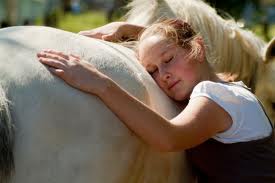
From the great The Horse website.
Wouldn’t it be great if researchers could decipher a way to predict which horses are going to be motivated to learn new things? A group of equitation scientists from the Czech Republic tried, but according to their recent study results, the best predictor of whether a horse is motivated to learn is someone who knows the animal.
“In our study, only the assessment of a horse’s good learning ability by a person having a long-lasting relationship with the horse could significantly predict if it would complete the task (in the study),” said Miroslava Pokornà, PhD candidate and researcher in the department of ethology at the Institute of Animal Science in Prague. Pokornà completed her research under the supervision of Jitka Bartošová, PhD, and presented the findings at the 8th International Society for Equitation Science conference, held July 18-20 in Edinburgh, Scotland.
Pokornà and colleagues ran a common spatial learning test on 53 riding horses: the horses had to learn to walk 25 meters (82 feet) around a fence to get to a bucket of food. Before starting the test, the researchers evaluated many different parameters that might predict the outcome of horses’ success. The list included age, sex, personality (as judged by the horse’s owner), dominance status, social dependency on other horses and on humans, and its estimated learning ability (again, as judged by the horse’s owner).
None of these parameters seemed to have any kind of consistent connection with whether the horse succeeded in the test or not–except for the owner’s evaluation of the horse’s learning ability. Results indicated that 55% of the horses described as having a “high” learning ability succeeded, whereas only 16% of those considered to have “moderate” learning ability were successful.
There were only two horses that were judged by their owners as having a “low” learning ability. The researchers determined that there weren’t enough “low learners” to provide scientifically reliable results, so they were excluded from the analysis.
Overall, less than half of the horses–24, to be specific–succeeded in the test, Pokornà said. Of the 29 that did not succeed, 15 didn’t even finish training: Nine failed the first test and five lost motivation during the testing process.
“Recognizing that a horse isn’t motivated to complete a task is important from a training point of view but also from a welfare point of view,” said Pokornà. “Welfare is often compromised … when (a horse is) exposed to a procedure it perceives as unpleasant or frightening.”
